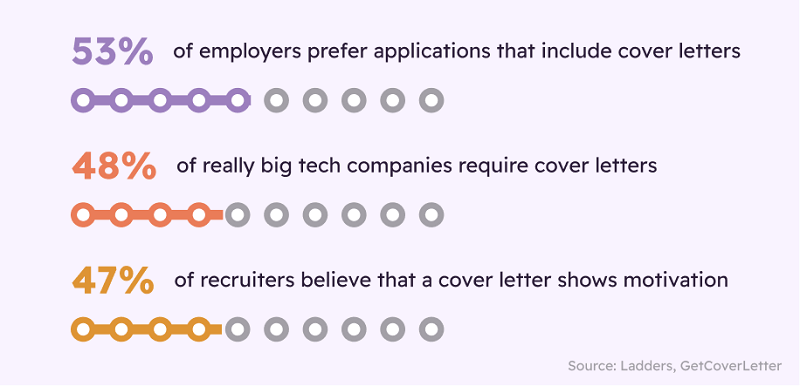Cover letters are one of the most important parts of the job application process. It’s a way for you to explain why you’re a good fit for the position. But are cover letters necessary?
Cover letters make you stand out from other candidates. It’s also an opportunity for you to show off your writing skills. And that can be useful during an interview or follow-up email exchange.
But, in this age of technology, it’s understandable why people still wonder, “Do I need a cover letter?” Especially since you can submit many applications online or via text message.
So are cover letters necessary? And do you need one? This guide will answer these questions and share expert cover letter tips that can help you land an interview.

Table of Contents
Cover Letters Can Make a Significant Difference in Your Job Application
Cover letters are not necessary, but they can make a huge difference in your job application. Here’s what we mean.
If you’re applying for a job and don’t have a cover letter, it’ll be hard to stand out from other applicants. And that’s because cover letters show why you want to work at a particular company and are serious about it.
For example, two equally qualified candidates are applying for a position, one with a cover letter and one without.
Chances are that the applicant who took the time to write a well-crafted cover letter will get an interview. And that’s because the person, for example, highlighted how their previous accomplishments would help the company to improve.
It’s simply not enough to send only your resume in most situations.
Are Cover Letters Necessary?
Yes, in most cases.
What you should know about cover letters is that they’re optional for some jobs. For example, your resume alone will likely be enough if you apply for an internship or a low-level assistant position.
However, let’s say you’re applying for a higher position, like an executive director position. First, you’ll need to have a well-written cover letter. That will help prove that you’ve researched the company and are interested in being part of its team.
Expressing your interest in an organization isn’t something the hiring manager will get from your application online. That’s why cover letters are crucial and should not be ignored.
Do You Really Need a Cover Letter in 2022?
The short answer is yes; you still need a cover letter in 2022.
One of the purposes of a cover letter is to demonstrate that you understand the position and are invested in it.
They give employers a good idea of who you are as an applicant. And that makes it easier for them to decide whether or not they want to interview you for their open positions.
Your cover letter can also help distinguish you from other candidates who apply for similar positions. You can use your cover letter as an opportunity to show more about yourself than what’s available on paper!

Tips to Prepare a Perfect Cover Letter
1. Do Your Research
A cover letter is an opportunity to tell a potential employer why they should hire you. So it should be tailored for each job and company.
The first task is to research the company and role, including the person reading your cover letter. It’s not always the hiring manager. Try to find out what they’re looking for in an employee and how their organization operates.
This will give you insight into what’s important to them in an applicant.
Also, take some time to think about how today’s job market differs from that of several years ago. That can help you fine-tune your cover letter. It doesn’t matter if the change is small. It can make a huge difference.
2. Tailor Your Cover Letter to Each Role
The first and last thing you want to do is address the person reading your cover letter. Then, when applying for a job, read up on the company and find out who the hiring manager is.
If there’s no name listed in the job description, call or email someone at the company to ask whom you should address it.
If there are multiple people responsible for hiring decisions, make sure to address each one individually. For example: “Dear [Hiring Manager],” “To Whom It May Concern:” and “Hello Mr./Ms.[First Name]. ‘
3. Don’t Let Your Resume Appear in Your Cover Letter
The primary purpose of a cover letter is to highlight and sell your qualifications. Your resume is the place where you list everything you’ve done. So don’t repeat that information in your cover letter.
Instead, do the following:
- give a brief overview of your qualifications,
- why they make you a good fit for the job, and
- how they relate to the position requirements listed by the company.
Related: How to Address a Cover Letter Without a Name
4. Be Clear and Concise
Be clear and concise to get the most out of your cover letter. One page is okay if you can; you don’t need to use up all the space. If you have more than one page, use bullet points rather than paragraphs. That makes it easier to skim through quickly.
Your tone should be professional throughout. Also, avoid using too many buzzwords, if any, as they tend to be taken seriously if used sparingly.
Finally, consider adding an “about me” section near the end of your letter. You can use that section to list relevant information about yourself that doesn’t fit anywhere else in your application.
For example, employment history, educational background, or volunteer work.
5. Avoid Gimmicks, Like Weird Fonts and Drawings
Have you seen some cover letters that looked like a child wrote them? Or that included a drawing of the applicant’s pet cat? Cover letters are not the place to do that; avoid these gimmicks.
They will not help you get the job. In fact, they can do more harm than good by making you seem less professional. It can overshadow your best qualities as an employee.
Try to avoid using standard intro like “My name is [your name], and I am applying for the [position] at [company].” This is not original or creative; it’s uninteresting to read.
Instead, personalize it: “Hi, [name], My name is John Doe, and I’m applying for the Marketing Manager role at ABC Company.”
Having a friendly title will help establish rapport between readers. But don’t be too casual or informal. You want to keep things professional so that they can see how well you’ll fit in with their team or company culture if hired.
6. Use Action Words to Highlight Your Accomplishments
Use action words that highlight your accomplishments and experiences. For example, try using phrases like “increased sales by 55% within 6 months.” Or “led team through a project from concept stage to completion within two weeks.”
This way, even if someone doesn’t remember everything about you, these phrases will help them know whether or not you have what it takes.
7. Don’t Make It All About You
Don’t make the mistake of making the cover letter all about you. Instead of boasting about a skill, talk about how that skill can help the potential employer.
How are you the perfect fit for the company? How will you contribute to the company’s success? And what have you done or will do to help the company? Answer these questions in your cover letter.
8. End Your Cover Letter with Enthusiasm
You may be well qualified and rightfully confident in your abilities. But employers still want to know that you’ll be a motivated and enthusiastic employee.
So, remember to end your cover letter with enthusiasm. This will show your interest in the position and willingness to work hard and passionately if hired.
You have a greater chance of being employed if you are enthusiastic. And you’re also far more likely to stay on board over the long term. So it makes sense that 71% of CEOs believe that employee engagement is essential to the success of their company.
As a result, often, the only factor distinguishing two equally qualified candidates is their level of passion and zeal for the job.
Check our guide on how to write a cover letter for more in-depth details.
Why Is a Cover Letter Important?
Your cover letter gives the hiring manager a chance to know you better. In addition, it’s an opportunity for you to show off your writing skills and make yourself stand out from the crowd.
You can also use it to sell yourself, highlighting why they should hire you, not someone else.
Because there are so many applicants for every open position, employers have less time and resources to read through them. So it’s up to you to make sure that yours stands out from the rest.
The best way is by using a well-crafted cover letter that showcases how great an employee you’ll be if given a chance.
When Can You Skip a Cover Letter?
If you’re applying for a job that doesn’t require a cover letter—say, an internship—you can skip it. In fact, many employers will be quite clear in their postings when they don’t want to see your cover letter.
If the company does not specifically state that it wants a cover letter, you can assume it’s unnecessary.
Sometimes, job listings or job descriptions don’t mention a cover letter. But it has all the other required materials, like a resume and references.
In such a situation, submit those documents without attaching additional materials such as your cover letter or résumé summary statement.
Cover Letters Alone Can’t Get the Job Done
You want to make sure you don’t let your employer down before they even meet you. In fact, without a cover letter, you might not even have the chance to meet them. Most recruiting managers expect to receive a cover letter from you.
It helps them get a sense of who you are and decide if you’re a suitable fit for the position.
However, you can’t rely solely on a cover letter to get a job. It’s not an alternative to a resume nor an excuse for poorly prepared or formatted documents.
Also, there’s a difference between cover letters and resumes. Knowing the difference can help you craft the perfect cover letter or resume.
A good cover letter does have some value, though: briefly introducing yourself and explaining why you’re applying for the position. It also helps make your application stand out from the competition.
Conclusion
So, are cover letters necessary in 2022? Yes, if you want to stand out from the crowd of applicants. That said, your resume and online presence are enough to get noticed by recruiters these days.
But a well-written cover letter could give you an edge over other candidates.
A good cover letter will show that you care about the position and want it more than anyone else. And that makes all the difference when it comes to hiring decisions!
Well I definitely enjoyed reading it. This post provided by you is very constructive for accurate planning.